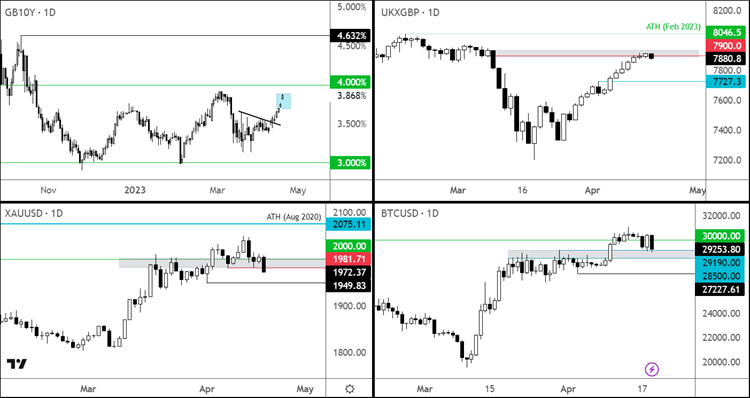
Risk sentiment turned negative during the European morning session, with zero- and low-yielding assets taking the brunt of the sell-off as bond yields continued to extend their recovery. Nasdaq futures (-0.8%), Gold (-1.5%), JPY/USD (-0.6%) and Bitcoin (-4%) had all fallen noticeably. It looks like UK's 10%+ CPI reading was the culprit. This has revived worries that interest rates will remain high for longer in the UK – and Europe, hurting the economy, which is probably why oil prices also slid (e.g., WTI being 2 % lower). At the time of writing, our UK 100 index was about 0.5% worse off on the session. The FTSE outlook and risk sentiment in general could sour even more if the upcoming earnings from Corporate America also suggest the US and global economies are weakening more than expected.
- Low and zero-yielding assets under perform as yields and dollar rise
- Hot UK inflation weighs on risk assets
- Netflix starts tech earnings on a negative note
What does it all mean for UK interest rates?
This week’s higher-than-expected UK wage growth and another double-digit inflation print have cemented expectations over another 25-basis point rate hike from the Bank of England next month.
Unlike some other regions in the world where price pressures have eased markedly, UK’s nightmare with inflation continues. It is a tough pill to swallow if you are a member of the Monetary Policy Committee at the Bank of England. A lot of fingers will be pointed towards Governor Bailey. Critics would argue he was too slow to respond to the emerging inflation threat last year and that mistake continues to threaten his and BoE’s credibility. By taking their sweet time in raising interest rates, the MPC will now have to over-correct with further rate rises than they were previously planning. This is of course the last thing the economy needs right now, with household incomes being squeezed due to the cost-of-living crisis. Little wonder why everyone is going on strike.
The sticky inflation means workers will continue to demand for higher pay, putting pressure on businesses as well as government finances and services. We already saw some evidence of this in Tuesday’s employment report which showed nominal wages in the UK grew more than expected.
How bad was UK’s inflation data?
In short, super-bad. Headline CPI came in at double digits for the 7th consecutive month. While the 10.1% print for March was lower than 10.4% recorded the month before, it was still well above expectations. Core CPI inflation was also stronger than forecast, remaining unchanged at 6.2% and defying expectations of a fall to 6%. The pound rose initially although the GBP/USD pair later relinquished its gains as risk sentiment soured.
Wage-price spiral
The persistency of price and wage growth is raising serious concern that wages and prices are feeding on each other over a sustained period. This wage-price spiral is raising fears that inflation expectations might become unanchored.
Focus turns to US techs earnings
Netflix produced results than were not very good last night, causing its shares to drop sharply in afterhours trading. US technology sector earnings will kick off in earnest with Tesla set to follow tonight. Microsoft, Alphabet, Amazon, and Meta are scheduled to post their numbers next week, followed by Apple in early May. These results will have an impact on the S&P 500, as well as the other major indices.
FTSE outlook: UK index stalls at key resistance
The hot UK inflation data has weighed on the FTSE, although given that the index is most comprised of banks, miners and multinational corporations, it tends to be less sensitive to UK inflation data than for example the Nasdaq is to US inflation data. For now, it is finding resistance around 7900 which was also a major high it has formed previously (in 2018). So, there is a risk we could see some weakness here for a while, especially if the upcoming earnings from Corporate America also suggest the US and global economies are weakening more than expected.

Source: TradingView.com
-- Written by Fawad Razaqzada, Market Analyst
Follow Fawad on Twitter @Trader_F_R
How to trade with City Index
You can trade with City Index by following these four easy steps:
-
Open an account, or log in if you’re already a customer
• Open an account in the UK
• Open an account in Australia
• Open an account in Singapore
- Search for the company you want to trade in our award-winning platform
- Choose your position and size, and your stop and limit levels
- Place the trade











